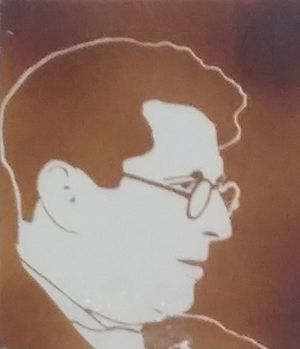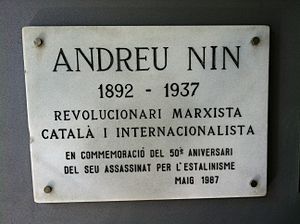Andreu Nin facts for kids
Andreu Nin Pérez (born February 4, 1892 – died June 20, 1937) was an important Spanish politician, translator, and writer. He was a communist, meaning he believed in a society where everyone is equal and resources are shared. In 1937, during the Spanish Civil War, Andreu Nin and other leaders of his political group, POUM, were arrested. They were wrongly accused of working with the other side, the Nationalists. Sadly, he died while being held. Many years later, in 2013, the Parliament of Catalonia honored him for his political work, especially his time as the Justice Minister of Catalonia.
Contents
Andreu Nin's Early Life
Andreu Nin was born in El Vendrell, Tarragona, Spain. His family was not wealthy; his father was a shoemaker and his mother was a farmer. Before World War I, Nin moved to Barcelona. For a short time, he taught at a school that was not connected to any religion. Soon after, he became a journalist and an activist, working to bring about social change. In 1917, he joined the Spanish Socialist Workers' Party (PSOE).
Becoming a Political Leader
Nin became a key leader in the Spanish workers' movement. He helped create the Communist Party of Spain (PCE). Later, he worked for international communist organizations in the Soviet Union. These included the Comintern, which supported communist parties worldwide, and the Red International of Labour Unions (RILU), which focused on workers' unions.
While in Russia, Nin became a supporter of the Left Opposition. This group disagreed with Joseph Stalin, who was gaining power in the Communist Party of the Soviet Union. For a brief period, Nin even worked as a secretary for Leon Trotsky, another important communist leader. During this time, Nin also started translating many of Trotsky's writings into Spanish and Catalan.
Forming New Political Groups
When Andreu Nin returned to Spain, he helped form the Communist Left of Spain (ICE). This group was connected to the Trotskyist movement, which followed Trotsky's ideas. However, the ICE was a small group and felt quite alone. Nin had some disagreements with Trotsky during this period. Trotsky suggested that the ICE should join the Socialist Youth of Spain to gain more members. But Nin believed it would be better to form a new party with the Workers and Peasants Bloc (BOC). The BOC was another group that came from the communist movement.
POUM: A New Political Party
Eventually, Andreu Nin decided to break away from Trotsky's ideas on this matter. He went ahead with his plan to merge with the Workers and Peasants Bloc. In 1935, along with Joaquín Maurín, he helped create the Workers' Party of Marxist Unification (POUM). This new party offered a different communist path compared to the PCE, which was closely linked to Moscow.
Nin's Role in the Government
When the Spanish Civil War began, the region of Catalonia got its regional government, the Generalitat, back. Andreu Nin joined this government, led by Lluís Companys, as the regional Minister of Justice. However, as communists loyal to Moscow gained more influence in the Spanish Republican government, they started to remove former communists and those not controlled by Moscow. This included members of POUM.
On December 16, 1936, the Soviet consul, Vladimir Antonov-Ovseenko, threatened to stop Soviet aid if Nin remained in the government. Because of this pressure, Companys removed Nin from his position.
Arrest and Disappearance
After a period of violence in Barcelona known as the May Days of Barcelona, the government declared POUM illegal on June 16, 1937. This was due to pressure from the PCE. Following orders from Alexander Orlov, Andreu Nin and most of the POUM leaders were arrested. They were sent to a camp near Madrid, in Alcalá de Henares.
Andreu Nin was held and questioned for several days. He was under the supervision of the NKVD, a Soviet secret police force. Jesús Hernández Tomás, who was a Communist Party member and a government minister at the time, later wrote about Nin's strength during this difficult period. He mentioned that Nin was very brave and did not give in.
Andreu Nin was sadly killed on June 20, 1937.
Federica Montseny, who was the Health Minister, was one of the first people to publicly ask about Nin's whereabouts when there was no news of him.
See also
 In Spanish: Andrés Nin para niños
In Spanish: Andrés Nin para niños
 | Misty Copeland |
 | Raven Wilkinson |
 | Debra Austin |
 | Aesha Ash |



